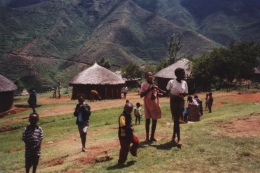Sesotho is a Bantu language that is spoken in South Africa. Sesotho is also one of the 2 official languages that spoken in Lesotho. Approximately 5 million peoples speak this language. Speakers can also be found in Botswana, Namibia and Zambia. Sesotho is a member of the Sotho group of languages. It falls under the Nguni or Southeastern languages. It belongs to the Niger-Congo language family. If you are planning on visiting South Africa or Lesotho, it may be helpful to learn a few phrases in the Sesotho language.
Sesotho was among the first African languages to develop a written form. The French Missionary Eugene Casalis was the first person to put down Sesotho in writing. He compiled the first Sesotho grammar book in 1841. Rev A. Mabille compiled the first list of Sesotho words. Rev. Mabille was married to Casalis’ daughter. She taught the Reverend Sesotho, while he was still in Europe. Rev. Mabille also started the first printing press in Lesotho, which still exists up to date. The written form was mainly based on the Tlokwa dialect. Currently, the Fokeng and Kwena dialects have been used for writing. Sesotho is rich in written literature. There is a Sesotho Bible, magazines, books and newspapers. The Kwena dialect was used to write the first Sesotho Bible and it eventually became the standard way of writing the language. The Kwena dialect was used by Moshoeshoe, who was considered to be the father of the Basotho people. One of the main things that differentiates the way Sesotho is written from other Ntu group of languages is that Sesotho is written disjunctively, while other Ntu languages are written conjunctively.
Alternate languages for Sesotho include Suto, Sisutho, Souto, Southern Sotho and Suthu. The Sesotho language is closely related to Sestswana and Northern Sotho. Language dialects include Setaung, Sephuthi, Sekwena, Sekgolokwe, Serotse and Setlokwa. Even though the Sesotho spoken in Qwaqwa and in Lesotho were once thought to be the purest form of the language, language change has taken place. Sesotho has been influenced by other neighboring languages such as Nguni, Khisa, Zulu, English and Afrikaans.
